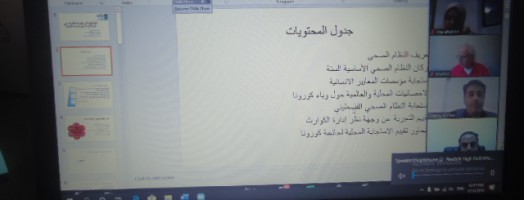Health policies in the Gaza Strip during the Corona Virus crisis
Gaza – Tuesday 16 June 2020, The Institute of Law at Birzeit University, organized a legal encounter entitled “Health policies in the Gaza Strip during the Corona Virus crisis”.
Dr. Osama Bil’awi, has first explained what is meant by a health system, as it is used to define the whole group of organizations, institutions and resources that aim to improve the health, and the system’s needs to employees, funds, information, means of transportations and communication, and general directives. Dr. Bil’awi has also mentioned that the health system is based on six pillars; the leadership and governance of the health system; technology and the computer system; the funding; the healthcare institutions and the health services; human resources; and finally the pharmaceutical products and the medical supplies.
Dr. Bil’awi then presented statistics of the Covid 19 pandemic on a universal scale, and the statistics on the local level in the Gaza Strip. He mentioned that the number of confirmed cases in Gaza is 72, of which 45 has recovered, which leave us with 26 active cases. The compulsory quarantine for travelers entering the Strip from all the crossings was implemented on the 15th of March, and there were two hospitals used as quarantine hospitals; the European Hospital, and a field hospital built in Rafah.
Dr. Bil’awi went on speaking about the response of the Palestinian health system, which includes the structural framework and the response committees, public policies, and the certain procedures that were implemented. He also explained the general purposes of the emergency plan, which includes: strengthening the governance and the management of the response to Covid 19, ensuring the provision of the health services and its continuation, the support services related to Covid 19, and strengthening the health education, and the support of human resources, and the provision of pharmaceuticals, medical devices, and logistics support.
Dr. Bil’awi then went on evaluating the local response to Covid 19 pandemic, of which informing the public is an important part. Providing the tests and the treatment, protecting the doctors and all those who work on the front line, lessening the risks of the propagation of the virus in prisons, providing water and improving the hygiene, and managing the crisis in way that respects human rights and being able to deal with the effects of social distancing are all standards for evaluating the local response to the pandemic.
In the end of the encounter the participants were given the opportunity to discuss the matter. Many questions were asked, comments were made and recommendations were given. To mention few of these recommendations: the importance to manage the crisis in a way that guarantees the respect of human rights, the procedures taken that aim to limiting the movement of the citizens, and to stop some of the medical treatment and operations shouldn’t limit the right of elderly people, people with disability, and the mother and child access to healthcare, and the need to establish a developed system of contact tracing, and working seriously on limiting the economic effect of the pandemic to respect the economic rights of every individual, including those with limited income, and those working in free professions, and ensuring that the most vulnerable don’t lose their housing because of their inability to pay the rent.











